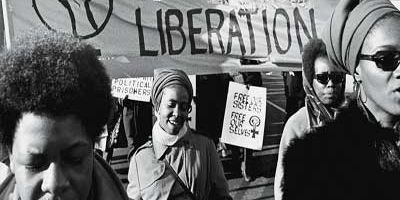Black Feminist Contradictions: We All Got 'Em
 There will always be debate about what defines a feminist. While conservative women like Sarah Palin and Michelle Bachmann attempt to misappropriate the term and negate its progressive origins, Black women struggle to embrace it and see our place within the movement.
There will always be debate about what defines a feminist. While conservative women like Sarah Palin and Michelle Bachmann attempt to misappropriate the term and negate its progressive origins, Black women struggle to embrace it and see our place within the movement.Feminism (or Womanism if you please) is a Black woman's birthright
A feminist life is supposed to be a liberated one. A transcendent existence free of the constraints foisted upon us but a society that cares not for our best interest. Yet sometimes I feel constricted in trying to live up to the expectations I set for "good feminists." I often feel guilty for not living my life in complete accordance with feminist principles. (I've written about this before)
This tension is most acute in my personal life. My desire to dismantle the structures of oppression that limit the life chances and opportunities of marginalized groups often comes second to my longing to have a good time and enjoy my youth.
The entertainment I consume is particularly questionable by Black Feminist standards. It's violent, it's sexist, and often homophobic. I do not say this with pride, but I'm an avid listener of the most degrading type of rap music and loyal viewer of the most exploitative television. The irony (hypocrisy) of my media choices is not lost on me.
I worry often that partaking in the corrosive culture of hip hop in particular delegitimates my voice as an activist. Of course I could just give up my unhealthy habits, but it's not that simple. (Joan Morgan
My journey with feminism mirrors my personal faith in that I struggle daily to figure out the right balance for my life. Feminist theory remains a useful guide in helping me to understand myself and the world around me, but it is just that: theory. (Word to Patricia Hill Collins.)
The Christianity comparison is not meant to blaspheme but to illustrate that navigating personal belief systems is arduous because life is complex. Being a perfect feminist is impossible. Even icons stumble. (Alice Walker and Gloria Steinem immediately come to mind.) And I don't condemn them for their missteps because we're doing the best with what we know.
Maya Angelou famously mused, "When you know better, you do better." Those who seek to leave the world better than they found it must engage in self reflection. But spiritual survival requires that we make sure that self examination doesn't devolve into self flagellation. I can no l longer beat myself up over my feminist shortcomings. My Black Feminist contradictions will have to do.
Kimberly Foster is the Editor and Publisher of For Harriet. Email her at Kimberly@ForHarriet.com with comments or find her on Twitter.

No comments: